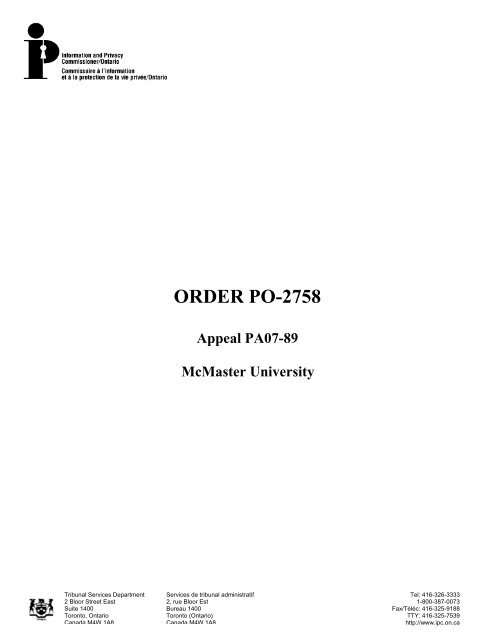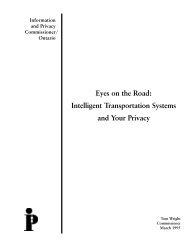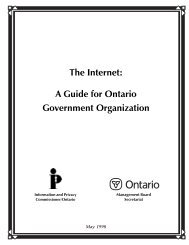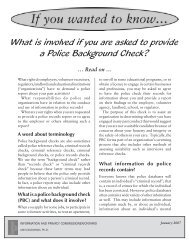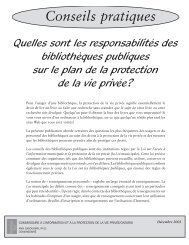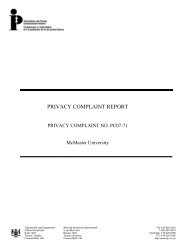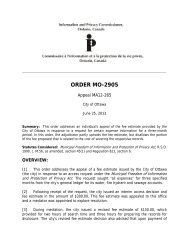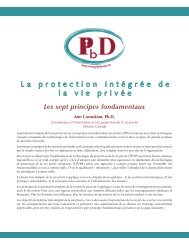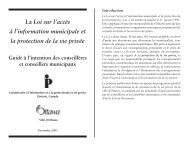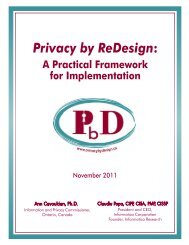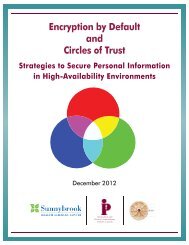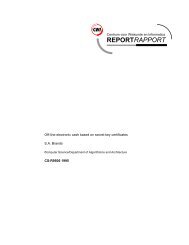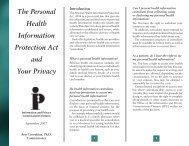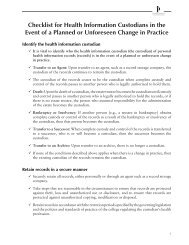ORDER PO-2758 - Information and Privacy Commissioner of Ontario
ORDER PO-2758 - Information and Privacy Commissioner of Ontario
ORDER PO-2758 - Information and Privacy Commissioner of Ontario
Create successful ePaper yourself
Turn your PDF publications into a flip-book with our unique Google optimized e-Paper software.
<strong>ORDER</strong> <strong>PO</strong>-<strong>2758</strong><br />
Appeal PA07-89<br />
McMaster University<br />
Tribunal Services Department Services de tribunal administratif<br />
2 Bloor Street East 2, rue Bloor Est<br />
Suite 1400 Bureau 1400<br />
Toronto, <strong>Ontario</strong><br />
Toronto (<strong>Ontario</strong>)<br />
Canada M4W 1A8<br />
Canada M4W 1A8<br />
Tel: 416-326-3333<br />
1-800-387-0073<br />
Fax/Téléc: 416-325-9188<br />
TTY: 416-325-7539<br />
http://www.ipc.on.ca
NATURE OF THE APPEAL:<br />
McMaster University (McMaster) received a request under the Municipal Freedom <strong>of</strong><br />
<strong>Information</strong> <strong>and</strong> Protection <strong>of</strong> <strong>Privacy</strong> Act (Act) from a member <strong>of</strong> the media for:<br />
…copies <strong>of</strong> all contracts between the university <strong>and</strong> food <strong>and</strong> beverage companies<br />
between 2004 <strong>and</strong> present. Contracts requested include any involving s<strong>of</strong>t drink<br />
companies, restaurants, … cafeteria contractors <strong>and</strong> vending machine operators.<br />
McMaster responded on December 19, 2006. The subject line <strong>of</strong> the letter identifies it as an<br />
“Interim Decision.” The first paragraph also states that the letter is an “interim” access decision:<br />
… On August 25, 2006, you submitted a request for all contracts between the<br />
University <strong>and</strong> food <strong>and</strong> beverage companies between 2004 <strong>and</strong> the present. I am<br />
now writing to provide you with an interim access decision <strong>and</strong> fee estimate.<br />
The “interim access decision” advised the requester that access to “certain portions” <strong>of</strong> the<br />
responsive records would be denied pursuant to section 18(1)(c) <strong>of</strong> the Act <strong>and</strong> that the estimated<br />
total fee to process the request was $98.05.<br />
In a separate letter, also dated December 19, 2006, McMaster wrote to the requester to advise<br />
that disclosure <strong>of</strong> two <strong>of</strong> the responsive records “… may constitute an unjustified invasion <strong>of</strong><br />
privacy pursuant to section 21(1) <strong>of</strong> the Act.” Section 21(1) is a m<strong>and</strong>atory exemption aimed at<br />
protecting personal privacy. McMaster also advised the requester that it had notified the<br />
individuals named in the two records under section 28(1)(b) <strong>of</strong> the Act, which requires such<br />
notice before disclosure <strong>of</strong> information “that the head has reason to believe might constitute an<br />
unjustified invasion <strong>of</strong> privacy for the purposes <strong>of</strong> clause 21(1)(f)….”<br />
On January 22, 2007, McMaster sent a letter to the requester advising that “a portion <strong>of</strong> two<br />
records that are responsive to your request shall be released to you, such records being copies <strong>of</strong><br />
contracts between McMaster University <strong>and</strong> food <strong>and</strong> beverage vendors. You shall be given<br />
access to a portion <strong>of</strong> the records within 30 days unless an appeal <strong>of</strong> my decision is commenced<br />
within such time period by either <strong>of</strong> the parties to whom the information relates.” The<br />
individuals contacted by McMaster in relation to these records did not appeal its decision to<br />
disclose redacted versions <strong>of</strong> these records, which are contracts they entered into with McMaster.<br />
McMaster then sent a further letter to the appellant dated February 27, 2007, which (like the first<br />
letter <strong>of</strong> December 19, 2006) has a subject line describing it as an “Interim Decision.” The<br />
February 27 letter states:<br />
I write in regards to the above noted matter. On August 25, 2006 you submitted a<br />
request under FIPPA for all contracts between the University <strong>and</strong> food <strong>and</strong><br />
beverage companies between 2004 <strong>and</strong> the present. Two <strong>of</strong> the contracts required<br />
us to provide notice to the third parties <strong>and</strong> to allow those third parties to make<br />
[IPC Order <strong>PO</strong>-<strong>2758</strong>/January 27, 2009]
- 2 -<br />
representation concerning the release <strong>of</strong> information contained in those contracts.<br />
I am now writing to provide you with an access decision <strong>and</strong> fee estimate.<br />
McMaster went on to advise the requester that upon payment <strong>of</strong> $35.74, it would release the<br />
portions <strong>of</strong> the responsive records that are not exempt under the Act. The February 27 letter<br />
again states that access to “certain portions” <strong>of</strong> the responsive records is denied under section<br />
18(1)(c) <strong>of</strong> the Act.<br />
The requester (now the appellant) appealed McMaster’s decision to this <strong>of</strong>fice in a letter dated<br />
March 6, 2007. During the intake stage <strong>of</strong> this appeal, McMaster forwarded a letter dated April<br />
4, 2007 to this <strong>of</strong>fice <strong>and</strong> raised the following concerns:<br />
• the appellant failed to appeal its access decision <strong>of</strong> December 19, 2006 within 30<br />
days <strong>of</strong> McMaster’s decision, as required under section 50(2) <strong>of</strong> the Act;<br />
• the appellant should be barred from appealing McMaster’s access decision <strong>of</strong><br />
December 19, 2006 because the appellant did not pay the requested $98.05 fee<br />
<strong>and</strong> obtain a redacted version <strong>of</strong> the records or appeal McMaster’s fee decision;<br />
<strong>and</strong><br />
• the appellant should be barred from appealing McMaster’s access decision <strong>of</strong><br />
February 27, 2007 because the appellant did not pay the requested $35.74 fee <strong>and</strong><br />
obtain a redacted version <strong>of</strong> the records or appeal McMaster’s fee decision.<br />
Initially, an Intake Officer from this <strong>of</strong>fice had discussions with the parties, in which the<br />
appellant confirmed that he was not appealing McMaster’s fee decisions. Despite being<br />
requested to do so, McMaster did not provide copies <strong>of</strong> the responsive records to this <strong>of</strong>fice<br />
during these discussions. This <strong>of</strong>fice opened an appeal file <strong>and</strong> subsequently appointed a<br />
mediator pursuant to section 51 <strong>of</strong> the Act.<br />
During mediation, McMaster continued to voice its concerns that the appellant should be barred<br />
from appealing its decision, <strong>and</strong> claimed that the appeal is frivolous or vexatious because the<br />
appellant did not pay or appeal the requested fees. Also during mediation, McMaster provided a<br />
copy <strong>of</strong> the responsive records to this <strong>of</strong>fice, which showed McMaster’s proposed redactions<br />
with highlighting.<br />
At the end <strong>of</strong> mediation, the appellant advised that he continues to seek access to the withheld<br />
portions <strong>of</strong> the food <strong>and</strong> beverage agreements located by McMaster. The appellant also<br />
explained that he did not appeal McMaster’s decision dated December 19, 2006 because he was<br />
<strong>of</strong> the opinion that it was an interim fee decision.<br />
As the issues were not settled in mediation, this appeal then moved on to the adjudication stage<br />
<strong>of</strong> the appeal process, in which an adjudicator conducts an inquiry under the Act. I was assigned<br />
as the adjudicator <strong>and</strong> provided a Notice <strong>of</strong> Inquiry to McMaster <strong>and</strong> all <strong>of</strong> the companies <strong>and</strong><br />
individuals identified as providing food <strong>and</strong> beverage services in the records, including the<br />
[IPC Order <strong>PO</strong>-<strong>2758</strong>/January 27, 2009]
- 3 -<br />
individuals notified by McMaster at the request stage. The individuals <strong>and</strong> companies will be<br />
referred to in this order as the “affected parties”.<br />
McMaster was invited to provide representations on all issues set out in the Notice <strong>of</strong> Inquiry.<br />
The Notice <strong>of</strong> Inquiry explained the background <strong>of</strong> the case <strong>and</strong> identified the following issues:<br />
• whether the appeal should not be heard on the basis that was filed late;<br />
• whether the request <strong>and</strong>/or appeal is frivolous or vexatious <strong>and</strong>/or an abuse <strong>of</strong><br />
process under section 10(1)(b) or in accordance with the principles enunciated in<br />
Order M-618;<br />
• the m<strong>and</strong>atory exemption at section 21(1) (personal privacy);<br />
• the m<strong>and</strong>atory exemption at section 17(1) (third party information); <strong>and</strong><br />
• the discretionary exemption at section 18(1)(c) (economic <strong>and</strong> other interests).<br />
The affected parties were also invited to provide representations.<br />
McMaster <strong>and</strong> four affected parties provided representations. One <strong>of</strong> the four affected parties<br />
providing representations claimed that the record pertaining to it is not responsive to the request,<br />
which accordingly became a further issue in the appeal, in addition to those identified above. A<br />
fifth affected party, one <strong>of</strong> the two who had been contacted by McMaster at the request stage<br />
with respect to a possible invasion <strong>of</strong> his privacy, <strong>and</strong> who did not provide written<br />
representations, telephoned this <strong>of</strong>fice to advise that he was not concerned about the disclosure<br />
<strong>of</strong> his name but had possible concerns about some portions <strong>of</strong> his contract for “competition<br />
reasons.” This affected party provided no further representations.<br />
A Notice <strong>of</strong> Inquiry was then sent to the appellant enclosing copies <strong>of</strong> the non-confidential<br />
portions <strong>of</strong> the representations <strong>of</strong> McMaster <strong>and</strong> the affected parties. With its representations,<br />
one <strong>of</strong> the affected parties provided copies <strong>of</strong> the records pertaining to it with proposed<br />
redactions that would withhold more information than McMaster had proposed doing. These<br />
copies <strong>of</strong> the records were not shared with the appellant for confidentiality reasons.<br />
The appellant subsequently provided representations, which were then shared with McMaster<br />
<strong>and</strong> all <strong>of</strong> the affected parties who had provided written representations in response to the initial<br />
Notice <strong>of</strong> Inquiry. McMaster <strong>and</strong> two affected parties responded with reply representations.<br />
RECORDS:<br />
The records at issue consist <strong>of</strong> the withheld portions <strong>of</strong> 21 agreements between McMaster <strong>and</strong> 15<br />
affected parties. The records include franchise agreements, franchise amending agreements,<br />
licensing agreements, agreements respecting the use <strong>of</strong> “Mac Express” cards, a caterer’s<br />
agreement, <strong>and</strong> a “supply” agreement.<br />
[IPC Order <strong>PO</strong>-<strong>2758</strong>/January 27, 2009]
- 4 -<br />
PRELIMINARY ISSUES:<br />
WHETHER THE APPEAL WAS FILED IN TIME<br />
Section 50(2) <strong>of</strong> the Act addresses the time for filing an appeal. It states:<br />
An appeal under subsection (1) shall be made within thirty days after notice was<br />
given <strong>of</strong> the decision appealed from by filing with the <strong>Commissioner</strong> written<br />
notice <strong>of</strong> appeal.<br />
McMaster initially responded to the appellant’s request on December 19, 2006. As noted above,<br />
in the subject (or “re”) line at the beginning <strong>of</strong> this letter, McMaster characterized it as an<br />
“interim” decision, <strong>and</strong> in the first paragraph <strong>of</strong> the letter, explained further that it was an<br />
“interim access decision <strong>and</strong> fee estimate.”<br />
As also noted above, in this “interim access decision,” McMaster claimed the exemption found at<br />
section 18(1)(c) <strong>of</strong> the Act in relation to “certain portions” <strong>of</strong> the responsive records. McMaster<br />
did not indicate how many responsive records it had located, nor did it indicate which specific<br />
portions were being withheld pursuant to this exemption. This letter also contained no reference<br />
to McMaster’s decision to notify two affected parties <strong>of</strong> the request pursuant to section 28(5) <strong>of</strong><br />
the Act, or to the fact that those parties had twenty days after notification to provide<br />
representations to McMaster in relation to those records, <strong>and</strong> that a subsequent decision would be<br />
made concerning access to those records. Significantly, that information was contained in a<br />
separate letter <strong>of</strong> the same date that was also sent to the appellant.<br />
McMaster’s later correspondence, outlined above <strong>and</strong> dated January 22 <strong>and</strong> February 27, 2007,<br />
referred to the notice to the other two parties <strong>and</strong> set out McMaster’s eventual decision to<br />
disclose the two records to the appellant in redacted form. The February 27 letter reiterated the<br />
University’s decision to apply section 18(1)(c) to “certain portions” <strong>of</strong> the records, but again<br />
provided no details. Although this appeared to be a final access decision in every respect, it was<br />
again titled an “interim” decision. This appears to have been a typographical error caused by reuse<br />
<strong>of</strong> the “re” line from the December 19 letter.<br />
Following the February 27 final decision, the appellant decided to file an appeal, which he did by<br />
a letter dated March 6, 2007, received in this <strong>of</strong>fice on March 7. This was well within the period<br />
<strong>of</strong> thirty days after the February 27 letter, but more that thirty days after December 19, 2006.<br />
McMaster objects to the timeliness <strong>of</strong> the appeal because it was filed outside the thirty day<br />
period following the “interim” decision <strong>of</strong> December 19.<br />
In its representations, McMaster states that “… there was no indication that the decision to redact<br />
portions <strong>of</strong> the Non-Personal <strong>Information</strong> Records was anything but a final decision.” One <strong>of</strong> the<br />
affected parties agrees that the appeal was out <strong>of</strong> time <strong>and</strong> supports this specific argument.<br />
[IPC Order <strong>PO</strong>-<strong>2758</strong>/January 27, 2009]
- 5 -<br />
In response, the appellant submits that:<br />
[h]aving labelled the December 19, 2006 letter an “Interim Decision”, I don’t<br />
underst<strong>and</strong> McMaster’s claim that it is a “final decision”. Even if this was their<br />
intention, this is not how a reasonable requester would have interpreted the letter.<br />
It would be grossly unfair to deny a right <strong>of</strong> appeal in these circumstances.<br />
McMaster’s reply submissions concede that the December 19 letter was identified as an<br />
“interim” decision, but argue that “… this decision was labelled “interim” because a final<br />
decision had not been made in respect <strong>of</strong> two <strong>of</strong> the records.…”<br />
As I have already noted, the two records that were supposedly the subject <strong>of</strong> the “interim”<br />
decision were not even mentioned in McMaster’s letter <strong>of</strong> December 19 claiming section<br />
18(1)(c). They were the subject <strong>of</strong> a separate letter, which, oddly, was not referred to as an<br />
“interim” decision.<br />
I am in full agreement with the appellant’s position on this issue. Regardless <strong>of</strong> McMaster’s<br />
intentions, its December 19 letter used the phrase, “interim access decision.” On this basis, the<br />
only reasonable interpretation <strong>of</strong> the letter is that the decision to claim section 18(1)(c) was an<br />
“interim” decision, since that was the only access decision set out in the letter in question. That<br />
being the case, there was no basis for the appellant to believe that he was required to file an<br />
appeal <strong>of</strong> the section 18(1)(c) decision at that time, <strong>and</strong> to hold him to such a requirement would<br />
be unfair. It would also be contrary to the spirit <strong>of</strong> access-to-information legislation, whose<br />
purpose is to provide access to the records <strong>of</strong> public institutions.<br />
Moreover, I note that the issue <strong>of</strong> appealing an “interim” access decision is expressly addressed<br />
in Order 81 <strong>and</strong> many subsequent orders. Order 81 describes the import <strong>and</strong> effect <strong>of</strong> an interim<br />
access decision as follows:<br />
… Because the head has not yet seen all <strong>of</strong> the requested records, any final<br />
decision on access would be premature, <strong>and</strong> can only properly be made once all <strong>of</strong><br />
the records are retrieved <strong>and</strong> reviewed. However, in my view, if no indication is<br />
made at the time a fees estimate is presented that access to the record may not be<br />
granted, it is reasonable for a requester to infer that the records will be released in<br />
their entirety upon payment <strong>of</strong> the required fees.<br />
"Interim" section 26 decisions are not binding on the head <strong>and</strong>, therefore,<br />
cannot be appealed to the <strong>Commissioner</strong>. [Emphasis added.]<br />
The fact that the access decision component <strong>of</strong> an “interim access decision <strong>and</strong> fee estimate”<br />
cannot be appealed was reiterated as recently as Order <strong>PO</strong>-2634, issued in January 2008. In my<br />
view, this provides a definitive basis for rejecting McMaster’s argument about the timeliness <strong>of</strong><br />
this appeal. I find that the appellant was in compliance with section 50(2) <strong>of</strong> the Act by filing his<br />
appeal when he did.<br />
[IPC Order <strong>PO</strong>-<strong>2758</strong>/January 27, 2009]
- 6 -<br />
FRIVOLOUS OR VEXATIOUS REQUEST/ABUSE OF PROCESS<br />
As noted above, McMaster objects to the appellant’s failure to pay the fees set out in its<br />
decisions, obtain the responsive records <strong>and</strong> review the proposed redactions before appealing<br />
McMaster’s decision to deny access. In its initial response to the appeal, McMaster characterizes<br />
the appeal <strong>of</strong> the decision to deny access as an attempt by the appellant “… to exercise a right <strong>of</strong><br />
appeal that is simply unavailable to it at this stage.”<br />
I would observe that this argument fundamentally contradicts the one I have just dealt with to the<br />
effect that the appeal was out <strong>of</strong> time; by contrast, in this instance, McMaster appears to argue<br />
that the appeal is premature. Regardless, I will go on to consider the merits <strong>of</strong> McMaster’s<br />
position.<br />
The right <strong>of</strong> appeal is set out in section 50(1) <strong>of</strong> the Act. The relevant portion <strong>of</strong> that section in<br />
the circumstances <strong>of</strong> this appeal states as follows:<br />
A person who has made a request for,<br />
(a) access to a record under section 24(1);<br />
… may appeal any decision <strong>of</strong> a head under this Act to the <strong>Commissioner</strong><br />
[emphasis added.]<br />
In my view, it is abundantly clear from the wording <strong>of</strong> this section that, where an institution<br />
decides to charge a fee <strong>and</strong> deny access to portions <strong>of</strong> a record, the requester may decide to<br />
appeal both decisions, or may appeal only the fee, or only the access decision (as the appellant<br />
has done here).<br />
The Act does not specify that the fee charged by an institution must be paid <strong>and</strong> the non-redacted<br />
portions <strong>of</strong> a record to which partial access is granted must be reviewed before the right <strong>of</strong><br />
appeal to deny access may be exercised, nor does McMaster point to any section <strong>of</strong> the Act that<br />
could possibly give rise to such an inference. In fact, this is a demonstrably incorrect<br />
interpretation that entirely contradicts the purpose set out in section 1 <strong>of</strong> the Act, <strong>of</strong> making<br />
records held by public institutions broadly accessible to members <strong>of</strong> the public unless they are<br />
subject to an exemption. For example, if the fee were not $100 but were, instead, $10,000,<br />
McMaster’s position would require a requester to apply substantial resources in order to obtain a<br />
record that might well be entirely unsatisfactory because <strong>of</strong> what had been redacted, before<br />
enjoying the right <strong>of</strong> appeal so clearly conferred by section 50(1). This cannot possibly have<br />
been the Legislature’s intention.<br />
In its appeal representations, McMaster exp<strong>and</strong>s on this argument under the heading, “Frivolous<br />
or vexatious request/abuse <strong>of</strong> process”. It submits:<br />
… the appellant’s continued refusal to pay the prescribed fee (or even request a<br />
waiver <strong>of</strong> the fee) <strong>and</strong>, in turn, review the Records can only be described as an<br />
abuse <strong>of</strong> process. That is, McMaster is <strong>of</strong> the opinion that the Appellant may be<br />
[IPC Order <strong>PO</strong>-<strong>2758</strong>/January 27, 2009]
- 7 -<br />
acting in bad faith by continually refusing to pay the prescribed fee, or at least<br />
request a waiver <strong>of</strong> such fees, <strong>and</strong> review the redacted records.<br />
How can the Appellant possibly know that McMaster has redacted the particular<br />
portions <strong>of</strong> the Records which the Appellant initially sought to review?<br />
McMaster submits that if the Appellant were truly interested in reviewing the<br />
Records, it would have paid the prescribed fee or requested a waiver <strong>and</strong> then,<br />
subsequently, examined the redacted records to determine if the information it<br />
wished to review had been revealed before even beginning the appeal<br />
proceedings. McMaster submits that the Request is, therefore, subject to an<br />
examination <strong>of</strong> whether such request has been made in good faith. McMaster<br />
shall not speculate as to what the purpose <strong>of</strong> the Request actually is, but given the<br />
refusal to review the Records despite having an opportunity to do so in a manner<br />
prescribed by the Act [sic], McMaster suggests that the purpose is something<br />
other than to obtain access <strong>and</strong> may therefore be frivolous, vexatious <strong>and</strong> an abuse<br />
<strong>of</strong> process.<br />
The appellant responds:<br />
The claim that my request is frivolous or vexatious or an abuse <strong>of</strong> process is<br />
unfounded <strong>and</strong> <strong>of</strong>fensive. It is grounded on the assumption that because I did not<br />
pay the fee for the records that McMaster did agree to provide, i.e.<br />
approx[imately] $100, I am not interested in accessing the records but [am]<br />
simply trying to interfere with the operations <strong>of</strong> the University or making the<br />
request for some other improper purpose. The claim itself is frivolous or<br />
vexatious. As a journalist, I have a clear interest in receiving information about<br />
contracts that public institutions enter into <strong>and</strong> … there is absolutely no basis for<br />
asserting that my claim is frivolous or vexatious or an abuse <strong>of</strong> process. I simply<br />
did not wish to pay $100 for records that clearly didn’t contain what I felt I<br />
wanted or had a clear right to receive so I decided to appeal directly rather than<br />
obtain incomplete <strong>and</strong> ultimately useless records.<br />
In its reply, McMaster reiterates that the appellant’s approach “… was a conscious decision to<br />
follow a procedure other than the one set out in the Act [sic]. Such conduct can only be<br />
described as frivolous, vexatious, or an abuse <strong>of</strong> process.”<br />
To reiterate, there is no “procedure” set out in the Act that would require payment <strong>of</strong> a fee <strong>and</strong><br />
inspection <strong>of</strong> a partially redacted record prior to filing an appeal <strong>of</strong> an access decision. This<br />
notion is entirely contradicted by the clear right to appeal “any decision <strong>of</strong> the head” conferred<br />
by section 50(1).<br />
As indicated by the title <strong>of</strong> this part <strong>of</strong> its submissions, McMaster appears to be arguing that the<br />
request is frivolous or vexatious, although its real objection appears to relate to the appellant’s<br />
decision to file an appeal. One <strong>of</strong> the affected parties agrees with McMaster’s submission in this<br />
regard.<br />
[IPC Order <strong>PO</strong>-<strong>2758</strong>/January 27, 2009]
- 8 -<br />
Frivolous or vexatious requests are dealt with in sections 10(1)(b) <strong>and</strong> 27(1) <strong>of</strong> the Act <strong>and</strong><br />
section 5.1 <strong>of</strong> Regulation 460.<br />
Section 10(1)(b) <strong>of</strong> the Act states:<br />
Every person has a right <strong>of</strong> access to a record or a part <strong>of</strong> a record in the custody<br />
or under the control <strong>of</strong> an institution unless,<br />
the head is <strong>of</strong> the opinion on reasonable grounds that the request<br />
for access is frivolous or vexatious.<br />
Section 27.1(1) <strong>of</strong> the Act states:<br />
A head who refuses to give access to a record or a part <strong>of</strong> a record because the<br />
head is <strong>of</strong> the opinion that the request for access is frivolous or vexatious, shall<br />
state in the notice given under section 26,<br />
(a)<br />
(b)<br />
(c)<br />
that the request is refused because the head is <strong>of</strong> the<br />
opinion that the request is frivolous or vexatious;<br />
the reasons for which the head is <strong>of</strong> the opinion that the<br />
request is frivolous or vexatious; <strong>and</strong><br />
that the person who made the request may appeal to the<br />
<strong>Commissioner</strong> under subsection 50 (1) for a review <strong>of</strong> the<br />
decision.<br />
Sections 5.1(a) <strong>and</strong> (b) <strong>of</strong> Regulation 460 prescribe that:<br />
A head … shall conclude that the request for a record or personal information is<br />
frivolous or vexatious if:<br />
(a)<br />
(b)<br />
the head is <strong>of</strong> the opinion on reasonable grounds that the<br />
request is part <strong>of</strong> a pattern <strong>of</strong> conduct that amounts to an<br />
abuse <strong>of</strong> the right <strong>of</strong> access or would interfere with the<br />
operations <strong>of</strong> the institution; or<br />
the head is <strong>of</strong> the opinion on reasonable grounds that the<br />
request is made in bad faith or for a purpose other than to<br />
obtain access.<br />
If McMaster was <strong>of</strong> the view that the request was frivolous or vexatious, this would in normal<br />
circumstances have been set out in one <strong>of</strong> its decision letters. It was not. There is, moreover, no<br />
evidence whatsoever to support an allegation that the request is part <strong>of</strong> a pattern <strong>of</strong> conduct that<br />
amounts to an abuse <strong>of</strong> the right <strong>of</strong> access, that it would interfere with the operations <strong>of</strong><br />
McMaster, or that the request was submitted in bad faith or for a purpose other than to obtain<br />
[IPC Order <strong>PO</strong>-<strong>2758</strong>/January 27, 2009]
- 9 -<br />
access. The appellant was simply exercising the rights conferred on him by section 50(1), as<br />
already outlined.<br />
Nor is there any evidence whatsoever to support McMaster’s argument that the request, or the<br />
appeal, represents an abuse <strong>of</strong> process at common law (as discussed in Order M-618, referred to<br />
in the Notice <strong>of</strong> Inquiry).<br />
I find that McMaster’s objection to the appeal <strong>and</strong>, apparently, the request, based on the<br />
appellant’s failure to pay the fee <strong>and</strong> review the redacted records, is without merit. In acting as<br />
he did, the appellant was simply exercising rights clearly conferred by section 50(1) <strong>of</strong> the Act.<br />
RES<strong>PO</strong>NSIVENESS OF RECORDS<br />
As noted above, one <strong>of</strong> the affected parties submits that the record pertaining to it is not<br />
responsive to the request. This record is a memor<strong>and</strong>um <strong>of</strong> agreement between McMaster <strong>and</strong> a<br />
private, non-pr<strong>of</strong>it organization.<br />
To reiterate, the appellant seeks access to the following records:<br />
…copies <strong>of</strong> all contracts between the university <strong>and</strong> food <strong>and</strong> beverage companies<br />
between 2004 <strong>and</strong> present. Contracts requested include any involving s<strong>of</strong>t drink<br />
companies, restaurants, … cafeteria contractors <strong>and</strong> vending machine operators.<br />
This affected party submits that it is not a food <strong>and</strong> beverage company, nor a s<strong>of</strong>t drink company,<br />
a restaurant, cafeteria contractor, or a vending machine operator. However, it concedes that it “...<br />
provides dining <strong>and</strong> other services.…”<br />
In <strong>Ontario</strong> (Attorney General) v. Fineberg (1994), 19 O.R. (3d) 197, the Divisional Court<br />
characterized the issue <strong>of</strong> the responsiveness <strong>of</strong> a record to a request as one <strong>of</strong> relevance, <strong>and</strong><br />
referred the matter back to the adjudicator. In Order P-880, Adjudicator Anita Fineberg followed<br />
the Court's guidance <strong>and</strong> stated:<br />
In my view, the need for an institution to determine which documents are relevant<br />
to a request is a fundamental first step in responding to the request. It is an<br />
integral part <strong>of</strong> any decision by a head. The request itself sets out the boundaries<br />
<strong>of</strong> relevancy <strong>and</strong> circumscribes the records which will ultimately be identified as<br />
responsive to the request. I am <strong>of</strong> the view that, in the context <strong>of</strong> freedom <strong>of</strong><br />
information legislation, "relevancy" must mean "responsiveness". That is, by<br />
asking whether information is "relevant" to a request, one is really asking whether<br />
it is "responsive" to a request. While it is admittedly difficult to provide a precise<br />
definition <strong>of</strong> "relevancy" or "responsiveness", I believe that the term describes<br />
anything that is reasonably related to the request.<br />
Institutions should adopt a liberal interpretation <strong>of</strong> a request, in order to best serve the purpose<br />
<strong>and</strong> spirit <strong>of</strong> the Act. Generally, ambiguity in the request should be resolved in the requester’s<br />
favour (Orders P-134, P-880).<br />
[IPC Order <strong>PO</strong>-<strong>2758</strong>/January 27, 2009]
- 10 -<br />
In my view, given the “dining <strong>and</strong> other services” this affected party concedes it provides to<br />
members <strong>of</strong> the McMaster community, it would be an unduly narrow interpretation <strong>of</strong> the<br />
request to exclude the memor<strong>and</strong>um <strong>of</strong> agreement from the scope <strong>of</strong> the request. In keeping with<br />
the authorities I have just cited, which I agree with, I find that the memor<strong>and</strong>um <strong>of</strong> agreement<br />
between McMaster <strong>and</strong> this affected party is responsive to the appellant’s request.<br />
DISCUSSION:<br />
PERSONAL INFORMATION/PERSONAL PRIVACY<br />
As outlined at the beginning <strong>of</strong> this order, McMaster notified several affected parties at the<br />
request stage to solicit their views on disclosure <strong>of</strong> two records that relate to them. In its letter to<br />
the appellant concerning the notification <strong>of</strong> these parties, McMaster referred to the possibility<br />
that “the release <strong>of</strong> two records that are responsive to your request may constitute an unjustified<br />
invasion <strong>of</strong> privacy pursuant to section 21(1)” <strong>of</strong> the Act.<br />
As also outlined above, one <strong>of</strong> the individuals named in these two contracts indicated verbally to<br />
this <strong>of</strong>fice that he does not object to disclosure <strong>of</strong> his name, but has concerns about disclosure <strong>of</strong><br />
other information for competitive reasons.<br />
Section 21(1) is a m<strong>and</strong>atory personal privacy exemption. It states that “[a] head shall refuse to<br />
disclose personal information to any person other than the individual to whom the information<br />
relates” (emphasis added) unless one <strong>of</strong> an enumerated list <strong>of</strong> six exceptions applies. The<br />
application <strong>of</strong> the exemption is therefore contingent on the records actually containing “personal<br />
information.” If no such information is contained in a record, section 21(1) does not apply.<br />
In its subsequent decision relating to these two records, McMaster indicated that portions would<br />
be withheld. The decision only refers to section 18(1)(c) <strong>and</strong> not to section 21(1). The copies <strong>of</strong><br />
the records showing proposed redactions did not indicate that McMaster proposes to withhold<br />
the names <strong>of</strong> the individuals who are parties to these contracts. As well, McMaster’s<br />
representations indicate that it does not rely on section 21(1). However, given that McMaster<br />
raised this exemption in its initial correspondence, <strong>and</strong> in view <strong>of</strong> its m<strong>and</strong>atory nature, I will<br />
consider whether the two records contain personal information.<br />
“Personal information” is defined in section 2(1) <strong>of</strong> the Act as “… recorded information about an<br />
identifiable individual …”, followed by a non-exhaustive list <strong>of</strong> examples. Section 2(3) provides<br />
that “personal information does not include the name, title, contact information or designation <strong>of</strong><br />
an individual that identifies the individual in a business, pr<strong>of</strong>essional or <strong>of</strong>ficial capacity.” In the<br />
circumstances <strong>of</strong> this appeal, I find that the affected parties’ names appearing in these two<br />
records, which are contracts, do not constitute personal information because the names appear in<br />
a business capacity.<br />
With respect to other information in these two records, in order to qualify as personal<br />
information, the information must be about the individual in a personal capacity. As a general<br />
rule, information associated with an individual in a pr<strong>of</strong>essional, <strong>of</strong>ficial or business capacity<br />
[IPC Order <strong>PO</strong>-<strong>2758</strong>/January 27, 2009]
- 11 -<br />
will not be considered to be “about” the individual [Orders P-257, P-427, P-1412, P-1621, R-<br />
980015, MO-1550-F, <strong>PO</strong>-2225].<br />
Even if information relates to an individual in a pr<strong>of</strong>essional, <strong>of</strong>ficial or business capacity, it may<br />
still qualify as personal information if the information reveals something <strong>of</strong> a personal nature<br />
about the individual [Orders P-1409, R-980015, <strong>PO</strong>-2225].<br />
None <strong>of</strong> the affected parties named in these two records has argued that the records contain<br />
personal information, <strong>and</strong> having reviewed them, I can find no evidence that they “reveal<br />
something <strong>of</strong> a personal nature.” Accordingly, I find that neither the names <strong>of</strong> the affected<br />
parties, nor the other contents <strong>of</strong> these two records, constitute personal information.<br />
Accordingly, these records are not exempt under section 21(1). I will however, consider whether<br />
the redacted portions are exempt under section 17(1) or 18(1)(c).<br />
THIRD PARTY INFORMATION<br />
The potentially relevant portions <strong>of</strong> section 17(1) state:<br />
A head shall refuse to disclose a record that reveals a trade secret or scientific,<br />
technical, commercial, financial or labour relations information, supplied in<br />
confidence implicitly or explicitly, where the disclosure could reasonably be<br />
expected to,<br />
(a)<br />
(c)<br />
prejudice significantly the competitive position or interfere<br />
significantly with the contractual or other negotiations <strong>of</strong> a<br />
person, group <strong>of</strong> persons, or organization;<br />
result in undue loss or gain to any person, group, committee<br />
or financial institution or agency; …<br />
Section 17(1) is designed to protect the confidential “informational assets” <strong>of</strong> businesses or other<br />
organizations that provide information to government institutions [Boeing Co. v. <strong>Ontario</strong><br />
(Ministry <strong>of</strong> Economic Development <strong>and</strong> Trade), [2005] O.J. No. 2851 (Div. Ct.)]. Although one<br />
<strong>of</strong> the central purposes <strong>of</strong> the Act is to shed light on the operations <strong>of</strong> government, section 17(1)<br />
serves to limit disclosure <strong>of</strong> confidential information <strong>of</strong> third parties that could be exploited by a<br />
competitor in the marketplace [Orders <strong>PO</strong>-1805, <strong>PO</strong>-2018, <strong>PO</strong>-2184, MO-1706].<br />
For section 17(1) to apply, the institution <strong>and</strong>/or the third party must satisfy each part <strong>of</strong> the<br />
following three-part test:<br />
1. the record must reveal information that is a trade secret or scientific,<br />
technical, commercial, financial or labour relations information; <strong>and</strong><br />
2. the information must have been supplied to the institution in confidence,<br />
either implicitly or explicitly; <strong>and</strong><br />
[IPC Order <strong>PO</strong>-<strong>2758</strong>/January 27, 2009]
- 12 -<br />
3. the prospect <strong>of</strong> disclosure <strong>of</strong> the record must give rise to a reasonable<br />
expectation that one <strong>of</strong> the harms specified in paragraph (a) <strong>and</strong>/or (c) <strong>of</strong><br />
section 17(1) will occur.<br />
Under part 3 <strong>of</strong> the test, the institution <strong>and</strong>/or the affected parties must provide “detailed <strong>and</strong><br />
convincing” evidence to establish a “reasonable expectation <strong>of</strong> harm”. Evidence amounting to<br />
speculation <strong>of</strong> possible harm is not sufficient [<strong>Ontario</strong> (Workers’ Compensation Board) v.<br />
<strong>Ontario</strong> (Assistant <strong>Information</strong> <strong>and</strong> <strong>Privacy</strong> <strong>Commissioner</strong>) (1998), 41 O.R. (3d) 464 (C.A.)].<br />
In this appeal, only five <strong>of</strong> fifteen affected parties responded in any way to the Notice <strong>of</strong> Inquiry,<br />
although it was sent to all fifteen.<br />
One <strong>of</strong> the affected parties submits that disclosure <strong>of</strong> portions <strong>of</strong> its contract, specifically the<br />
management fee it pays to McMaster <strong>and</strong> a 10-year financial model <strong>of</strong> its projected operating<br />
revenues <strong>and</strong> expenses, would “adversely prejudice” its competitive <strong>and</strong> economic interests, “…<br />
specifically with respect to its forthcoming negotiation for a renewal <strong>of</strong> its contract with its<br />
unionized work force, <strong>and</strong> generally with respect to its ability to negotiate or renew any contract<br />
for management services in the future.”<br />
A second affected party declines to consent to disclosure, stating that “the information has been<br />
supplied in confidence implicitly where disclosure could reasonably be expected to prejudice<br />
significantly the competitive position or interfere significantly with the contractual or other<br />
negotiations <strong>of</strong> a person, group <strong>of</strong> persons or organization.”<br />
A third affected party submits that its agreements have been consistently treated as confidential,<br />
<strong>and</strong> disclosure could reasonably be expected to prejudice its competitive position as they<br />
“contain details <strong>of</strong> virtually every operational <strong>and</strong> financial term” with its franchises, <strong>and</strong> this<br />
information “essentially provides the blueprint for the creation <strong>of</strong> a successful franchise system.”<br />
A fourth affected party submits that “a competitor could <strong>and</strong> would be highly motivated to<br />
access this information <strong>and</strong> would very easily prejudice [the affected party’s] competitive<br />
position in maintaining the contract … because <strong>of</strong> competitor’s knowledge <strong>of</strong> the exact amount<br />
by which it can undercut [the affected party].” The affected party submits that this would be an<br />
unfair advantage. This affected party also argues that disclosing details <strong>of</strong> its contracts with<br />
McMaster would jeopardize its negotiations with potential franchisees, who would then dem<strong>and</strong><br />
terms “at least as favourable” as those given to McMaster. This affected party also provides its<br />
own redacted version <strong>of</strong> the records pertaining to it, <strong>and</strong> seeks to exempt more information than<br />
McMaster decided to withhold. Although only the proposed redactions <strong>of</strong> McMaster are<br />
technically before me because this affected party did not appeal McMaster’s decision to disclose<br />
more information, my conclusion regarding section 17(1) takes these additional proposed<br />
redactions into account. This affected party also provides detailed submissions in relation to<br />
requirement 2, or the “supplied in confidence” aspect <strong>of</strong> the exemption. I will refer to these<br />
submissions in my discussion <strong>of</strong> that requirement, below.<br />
[IPC Order <strong>PO</strong>-<strong>2758</strong>/January 27, 2009]
- 13 -<br />
The other affected party who provided comments simply stated verbally that he had concerns <strong>of</strong><br />
a competitive nature about disclosure <strong>of</strong> some aspects <strong>of</strong> his contract. He did not indicate which<br />
portions those were, nor did he provide written representations.<br />
The appellant responded to the affected parties’ written submissions. In particular, the appellant<br />
contends that the agreements do not meet the “supplied” test under requirement 2, as discussed in<br />
more detail below. He also submits that the parties’ representations concerning harm, set out<br />
above, are not “detailed <strong>and</strong> convincing” <strong>and</strong> do not meet requirement 3.<br />
Two affected parties submitted reply submissions, in which they essentially reiterated the<br />
positions they had initially taken. The second affected party also sought to refute comments <strong>of</strong><br />
the appellant that I have not reproduced in this order because I do not need to rely on them to<br />
reach the conclusions I have concerning section 17(1).<br />
Part 1: type <strong>of</strong> information<br />
The types <strong>of</strong> information listed in section 17(1) have been discussed in prior orders.<br />
Commercial information is information that relates solely to the buying, selling or exchange <strong>of</strong><br />
merch<strong>and</strong>ise or services. This term can apply to both pr<strong>of</strong>it-making enterprises <strong>and</strong> non-pr<strong>of</strong>it<br />
organizations, <strong>and</strong> has equal application to both large <strong>and</strong> small enterprises [Order <strong>PO</strong>-2010].<br />
The fact that a record might have monetary value or potential monetary value does not<br />
necessarily mean that the record itself contains commercial information. [Order P-1621].<br />
Financial information refers to information relating to money <strong>and</strong> its use or distribution <strong>and</strong> must<br />
contain or refer to specific data. Examples <strong>of</strong> this type <strong>of</strong> information include cost accounting<br />
methods, pricing practices, pr<strong>of</strong>it <strong>and</strong> loss data, overhead <strong>and</strong> operating costs [Order <strong>PO</strong>-2010].<br />
Having reviewed the records, I find that they all contain commercial <strong>and</strong> financial information.<br />
Part 2: supplied in confidence<br />
This requirement contains two components, both <strong>of</strong> which must be met. The information must<br />
have been “supplied” within the meaning <strong>of</strong> section 17, <strong>and</strong> if it was, this must have been done<br />
“in confidence.” I will begin with a consideration <strong>of</strong> whether the information was “supplied.”<br />
Supplied<br />
As noted, the records at issue in this case consist <strong>of</strong> twenty-one contracts relating to food <strong>and</strong><br />
beverage operations at McMaster, or to the use <strong>of</strong> “Mac Express Patron Cards”. They include<br />
licensing <strong>and</strong> franchise agreements.<br />
The contents <strong>of</strong> a contract involving an institution <strong>and</strong> a third party will not normally qualify as<br />
having been “supplied” for the purpose <strong>of</strong> section 17(1). The provisions <strong>of</strong> a contract, in general,<br />
have been treated as mutually generated, rather than “supplied” by the third party, even where<br />
[IPC Order <strong>PO</strong>-<strong>2758</strong>/January 27, 2009]
- 14 -<br />
the contract is preceded by little or no negotiation or where the final agreement reflects<br />
information that originated from a single party [Orders <strong>PO</strong>-2018, MO-1706].<br />
McMaster’s representations expressly state that it “… does not believe that the information in the<br />
contracts would satisfy the Section 17 requirement that the information be ‘supplied’ in<br />
confidence.” McMaster does not rely on section 17(1) in this appeal.<br />
Only one <strong>of</strong> the affected parties addresses the meaning <strong>of</strong> “supplied” in its representations. This<br />
party argues that the effect <strong>of</strong> this interpretation, “… which excludes all contracts, regardless <strong>of</strong><br />
[their] substance, is inconsistent with legislative intent <strong>of</strong> the exemptions to protect confidential<br />
‘informational assets’ <strong>of</strong> businesses.” This affected party submits further:<br />
<strong>Information</strong> that is unilaterally “supplied” to the institution is not the only kind <strong>of</strong><br />
information that should be protected from exploitation by a competitor in the<br />
marketplace. The practical reality is that how information is “supplied” to the<br />
institution has no direct bearing on the confidential nature <strong>of</strong> the information. The<br />
narrow interpretation <strong>of</strong> the Act that excludes information on the basis <strong>of</strong> how it is<br />
provided to the institution is inconsistent with its purpose <strong>of</strong> balancing competing<br />
parties’ interests. In fact, it may be said that contracts that are generated through<br />
significant negotiation should be afforded a higher degree <strong>of</strong> protection under the<br />
exemption because the terms that are negotiated may include information about<br />
the third party’s competitive advantages, which would easily be exploited by a<br />
competitor in the marketplace.<br />
…<br />
[The affected party] submits that a purposive interpretation <strong>of</strong> the exemption<br />
provisions <strong>of</strong> the Act exempts information that is proprietary to the third party or<br />
unique to the transaction with the institution. Contracts that are not heavily<br />
negotiated, or st<strong>and</strong>ard form contracts, should be afforded a lower degree <strong>of</strong><br />
protection. In contrast, contracts that are highly negotiated likely contain highly<br />
specific <strong>and</strong> atypical business terms that tend to be more sensitive. …<br />
[The affected party] respectfully submits that with a purposive interpretation <strong>of</strong><br />
the exemption provisions, the sensitive commercial <strong>and</strong> financial information in<br />
the redacted portions <strong>of</strong> the records be considered to be supplied in confidence.<br />
The fact that there were negotiations between McMaster <strong>and</strong> [the affected party]<br />
leads to a reasonable inference, as would be expected by commercial st<strong>and</strong>ards,<br />
that the redacted information in the Records [was] supplied in confidence.<br />
In my view, the affected party’s representations amount to no more than a suggestion that the<br />
wording <strong>of</strong> the exemption is inappropriate, <strong>and</strong> as such, these representations provide no basis<br />
for reversing a well-established interpretation.<br />
As the appellant notes in his representations on this aspect <strong>of</strong> the exemption, this affected party<br />
concedes that the records it seeks to withhold were, in fact, the product <strong>of</strong> negotiations, which<br />
[IPC Order <strong>PO</strong>-<strong>2758</strong>/January 27, 2009]
- 15 -<br />
adds to the basis for concluding that they were mutually generated rather than “supplied” as<br />
required by section 17(1). This view is reinforced by the judgement <strong>of</strong> the Divisional Court in<br />
Grant Forest Products Inc. v. Caddigan, [2008] O.J, No. 2243.<br />
In that case, the Court upheld Adjudicator Beverley Caddigan’s decision not to uphold a section<br />
17 claim by an affected party because the records were contractual, <strong>and</strong> the information was the<br />
product <strong>of</strong> negotiation <strong>and</strong> not “supplied.” The Court stated (at paras. 4-8):<br />
The applicant takes issue with the Adjudicator's conclusion that the information<br />
relating to wood supply from private sources <strong>and</strong> total operating capacity was not<br />
supplied in confidence. …<br />
The Adjudicator found that the documents at issue were the result <strong>of</strong> a negotiation<br />
process. Indeed, that was made clear in a letter from the applicant to the Ministry<br />
dated October 19, 1998.<br />
The Adjudicator found that the letters <strong>of</strong> commitment were essentially a contract<br />
between the parties. There is a statement in the 1998 documents where the<br />
Ministry recognizes the "Ministry Recognized Operating Level" ("MROL"),<br />
which suggests this is a mutually agreed upon term <strong>of</strong> the contract between the<br />
parties.<br />
As a result <strong>of</strong> her findings, the Adjudicator concluded that the information in the<br />
documents was not "supplied" within s. 17(1) <strong>of</strong> the Act. She also held that there<br />
was insufficient evidence before her to show that any <strong>of</strong> the information,<br />
including the private source <strong>of</strong> wood supply, was "immutable" (even though the<br />
applicant did not raise the issue <strong>of</strong> immutability before her).<br />
On the record, the conclusion with respect to immutability was reasonable. In<br />
reaching her decision, the Adjudicator applied existing jurisprudence to the<br />
material before her. In our view, her decision was a reasonable one.<br />
As referred to by the Court, an exception to this rule exists if information in the records is<br />
“immutable”. An additional exception may apply where information permits the drawing <strong>of</strong><br />
accurate inferences as to information that was actually “supplied in confidence.” None <strong>of</strong> the<br />
affected parties argues that either <strong>of</strong> these exceptions applies, <strong>and</strong> having carefully reviewed the<br />
records, I find that they are not established.<br />
Based on my careful review <strong>of</strong> the records, I conclude that all <strong>of</strong> them are contracts, <strong>and</strong> based<br />
on the rule that contractual information will not generally have been found to have been<br />
“supplied” to McMaster, I find that requirement 2 under section 17(1) is not met. As all three<br />
requirements for the application <strong>of</strong> this exemption must be met, I find that none <strong>of</strong> the records<br />
are exempt under section 17(1).<br />
[IPC Order <strong>PO</strong>-<strong>2758</strong>/January 27, 2009]
- 16 -<br />
Requirement 3: harms<br />
My finding under requirement 2 is sufficient to dispose <strong>of</strong> the section 17(1) exemption. In<br />
addition, I have set out the principal arguments <strong>of</strong> the affected parties who provided<br />
representations in my introductory discussion, above, which relate to the “harms” aspect <strong>of</strong> the<br />
exemption referred to under requirement 3. An additional reason for not upholding the section<br />
17(1) exemption in relation to the records at issue is that I agree with the appellant’s submission<br />
to the effect that the affected parties who have provided representations have not provided<br />
“detailed <strong>and</strong> convincing” evidence <strong>of</strong> harm.<br />
Rather, their positions amount to speculation <strong>and</strong> fail to explain how any claimed damage to their<br />
negotiating or competitive position, or undue gain or loss, could reasonably be expected to occur.<br />
Even the fourth affected party, who identifies parts <strong>of</strong> the records that it argues could cause harm<br />
<strong>of</strong> this nature, treats it as self-evident that other parties could somehow dem<strong>and</strong> the same terms<br />
as were given to McMaster, regardless <strong>of</strong> the difference in their size or potential client base, or<br />
the passage <strong>of</strong> time, or other relevant factors that could be expected to inform any future<br />
negotiations.<br />
The same could be said <strong>of</strong> the party who argues that negotiations with unionized employees<br />
could be damaged. Its representations are general <strong>and</strong> speculative, <strong>and</strong> do not establish a<br />
reasonable basis for concluding that such harm could be expected to occur.<br />
I am therefore not satisfied that there is a reasonable basis on which to conclude that disclosure<br />
could produce harms <strong>of</strong> the nature alleged by the affected parties who chose to provide<br />
representations.<br />
For all these reasons, I find that section 17(1) does not apply to any portion <strong>of</strong> the records.<br />
ECONOMIC AND OTHER INTERESTS<br />
McMaster relies on section 18(1)(c) to deny access to the portions <strong>of</strong> the records it seeks to<br />
withhold. This section states:<br />
Section 18(1) states:<br />
A head may refuse to disclose a record that contains,<br />
(c)<br />
information where the disclosure could reasonably be expected to<br />
prejudice the economic interests <strong>of</strong> an institution or the competitive<br />
position <strong>of</strong> an institution;<br />
The purpose <strong>of</strong> section 18(1)(c) is to protect the ability <strong>of</strong> institutions to earn money in the<br />
marketplace. This exemption recognizes that institutions sometimes have economic interests <strong>and</strong><br />
compete for business with other public or private sector entities, <strong>and</strong> it provides discretion to<br />
refuse disclosure <strong>of</strong> information on the basis <strong>of</strong> a reasonable expectation <strong>of</strong> prejudice to these<br />
economic interests or competitive positions [Order P-1190].<br />
[IPC Order <strong>PO</strong>-<strong>2758</strong>/January 27, 2009]
- 17 -<br />
This exemption is arguably broader than section 18(1)(a) in that it does not require the institution<br />
to establish that the information in the record belongs to the institution, that it falls within any<br />
particular category or type <strong>of</strong> information, or that it has intrinsic monetary value. The exemption<br />
requires only that disclosure <strong>of</strong> the information could reasonably be expected to prejudice the<br />
institution’s economic interests or competitive position [Order <strong>PO</strong>-2014-I].<br />
For section 18(1)(c) to apply, the institution must demonstrate that disclosure <strong>of</strong> the record<br />
“could reasonably be expected to” lead to the specified result. To meet this test, the institution<br />
must provide “detailed <strong>and</strong> convincing” evidence to establish a “reasonable expectation <strong>of</strong><br />
harm”. Evidence amounting to speculation <strong>of</strong> possible harm is not sufficient [<strong>Ontario</strong> (Workers’<br />
Compensation Board) v. <strong>Ontario</strong> (Assistant <strong>Information</strong> <strong>and</strong> <strong>Privacy</strong> <strong>Commissioner</strong>) (1998), 41<br />
O.R. (3d) 464 (C.A.)].<br />
In its representations, McMaster refers to the principles referred to above, as set out in Orders P-<br />
1190 <strong>and</strong> <strong>PO</strong>-2014-I. It also refers to Order <strong>PO</strong>-1745. In that order, former Senior Adjudicator<br />
David Goodis upheld a claim under section 18(1)(c) by the <strong>Ontario</strong> Casino Corporation (OCC) to<br />
deny access to information about slot machines. The withheld information revealed “the average<br />
percentage <strong>of</strong> money that the slot machines <strong>of</strong> a given type at a given casino ‘held back’ during<br />
the given month.” In upholding OCC’s decision to deny access, the Senior Adjudicator stated:<br />
Notwithst<strong>and</strong>ing my reluctance to find a reasonable expectation <strong>of</strong> the harm<br />
alleged on the basis <strong>of</strong> the evidence before me, I am prepared to infer that such<br />
harm could reasonably be expected to result based on my independent analysis <strong>of</strong><br />
the facts <strong>and</strong> circumstances.<br />
…<br />
In short the failure <strong>of</strong> a party resisting disclosure to provide detailed <strong>and</strong><br />
convincing evidence will not necessarily defeat the claim for exemption where<br />
harm can be inferred from other circumstances.<br />
…<br />
The information at issue, the “hold percentages”, describes the pricing practices<br />
<strong>and</strong>/or strategies <strong>of</strong> the casinos for specific types <strong>of</strong> slot machines at specific<br />
locations. This information reveals how patrons, as an overall group, are<br />
“charged” on a monthly basis for the use <strong>of</strong> the machines, expressed as a<br />
percentage <strong>of</strong> amount wagered rather than as a dollar figure. Disclosure <strong>of</strong> this<br />
information could well increase competition by setting <strong>of</strong>f a price or “winnings”<br />
war among casinos within <strong>Ontario</strong>, as well as between <strong>Ontario</strong> casinos <strong>and</strong> those<br />
in border states such as Michigan <strong>and</strong> New York.<br />
… [C]ompetition from disclosure could reasonably be expected to produce lower<br />
revenues or pr<strong>of</strong>its for <strong>Ontario</strong> casinos, which in turn would prejudice the<br />
economic interests <strong>of</strong> the OCC. While I have not been presented with detailed<br />
[IPC Order <strong>PO</strong>-<strong>2758</strong>/January 27, 2009]
- 18 -<br />
<strong>and</strong> convincing evidence to demonstrate the degree <strong>of</strong> likelihood <strong>of</strong> increased<br />
competition <strong>of</strong> the sort described (which would have made this decision much<br />
easier), I am prepared in the circumstances to accept that this kind <strong>of</strong> competition<br />
among casinos serving a common market is, on balance, more likely than not to<br />
occur, with resulting prejudicial consequences to the economic interests <strong>of</strong> the<br />
OCC.<br />
In its representations, McMaster also refers to the need to demonstrate a “clear <strong>and</strong> direct<br />
linkage” between disclosure <strong>and</strong> the harm mentioned in section 18(1)(c). This <strong>of</strong>fice does not<br />
apply the “clear <strong>and</strong> direct linkage” test. Rather, as noted in Workers’ Compensation, cited<br />
above, detailed <strong>and</strong> convincing evidence <strong>of</strong> a reasonable expectation <strong>of</strong> harm is required, <strong>and</strong><br />
even if that evidence is not provided by a party, harm can also be inferred from the adjudicator’s<br />
independent analysis <strong>of</strong> the facts <strong>and</strong> circumstances as discussed in Order <strong>PO</strong>-1745.<br />
Referring to the records at issue in this appeal, McMaster submits:<br />
By revealing certain detailed negotiated financial payments contained in the<br />
Records such as rent, royalty payments, payment arrangements <strong>and</strong> other<br />
commercial terms, McMaster’s negotiating position is severely compromised<br />
when negotiating new agreements. The same can be said in instances where<br />
McMaster is attempting to negotiate renewal terms <strong>of</strong> existing agreements.<br />
McMaster argues that this is the case because:<br />
… the competitor would have knowledge <strong>of</strong> the actual pecuniary <strong>and</strong> commercial<br />
terms negotiated between McMaster <strong>and</strong> the original Service Provider. A<br />
precedent <strong>of</strong> a “floor” or ceiling would be established for any prospective supplier<br />
in advance <strong>of</strong> negotiations.<br />
McMaster also refers to a scenario involving two service providers attempting to pressure<br />
McMaster based on knowledge <strong>of</strong> terms <strong>and</strong> conditions previously negotiated by the other.<br />
McMaster goes on to submit that:<br />
[r]evealing the precise negotiated pecuniary terms <strong>of</strong> the records would hinder<br />
McMaster’s competitive position by providing an unfair competitive advantage in<br />
respect <strong>of</strong> negotiating position to parties with whom McMaster negotiates such<br />
contracts. In turn, this would cause significant harm to McMaster’s future<br />
economic interests by deflating the economic value <strong>of</strong> future negotiated contracts.<br />
The appellant disagrees with these submissions, referring to McMaster’s effective “monopoly” in<br />
controlling who can “do business” on campus. The appellant states:<br />
While negotiations can <strong>and</strong> do occur, the reality is that the food <strong>and</strong> beverage<br />
suppliers must agree to terms acceptable to McMaster if they want to do business<br />
on campus. So, even if one contractor is able to access the terms <strong>of</strong> the contract<br />
[IPC Order <strong>PO</strong>-<strong>2758</strong>/January 27, 2009]
- 19 -<br />
that a competitor has entered into with McMaster, it is simply not true that they<br />
can dem<strong>and</strong> similar or identical terms.<br />
…<br />
The terms contained in existing contracts were terms provided at a particular point<br />
in time. The release <strong>of</strong> such historic information cannot reasonably be expected<br />
to harm McMaster as such information is not necessarily relevant to future or<br />
upcoming negotiations.<br />
McMaster responds to the appellant’s submissions by arguing that the appellant “… completely<br />
fails to address the fact that having access to previously negotiated contracts gives third parties a<br />
negotiating advantage when dealing with McMaster.” McMaster also argues that the age <strong>of</strong> the<br />
information is irrelevant.<br />
I have considered these arguments <strong>and</strong> carefully reviewed the records. In my view, McMaster<br />
has not provided detailed <strong>and</strong> convincing evidence <strong>of</strong> harm, nor does this appeal present<br />
circumstances in which harm can reasonably be inferred as it was in Order <strong>PO</strong>-1745.<br />
I agree with the appellant that McMaster has significant power in determining what companies it<br />
will do business with. McMaster <strong>of</strong>fers an environment in which a large body <strong>of</strong> individuals<br />
require access to food <strong>and</strong> beverage services.<br />
Even more importantly, McMaster’s arguments ignore an absolutely fundamental fact <strong>of</strong> the<br />
marketplace. That is to say, if a competitor (or renewing party) truly wishes to secure a contract<br />
with McMaster, it will do so by charging lower fees to McMaster than its competitor, resulting in<br />
a net saving to McMaster. Similarly, in circumstances where McMaster is receiving payment, a<br />
competitor or renewing party would attempt to secure a contract by paying more than its rivals,<br />
resulting in financial gain for McMaster. To argue that disclosure <strong>of</strong> the rate information at issue<br />
would produce the opposite result flies in the face <strong>of</strong> commercial reality. In my view, this is a<br />
totally different situation than in Order <strong>PO</strong>-1745, where there was an obvious danger that<br />
customers would move to a casino where the slot machines had a lower “hold percentage.”<br />
For all these reasons, I find that section 18(1)(c) does not apply.<br />
CONCLUSION:<br />
As I have found that all the records identified by McMaster are responsive to the appellant’s<br />
request, <strong>and</strong> that none <strong>of</strong> the claimed exemptions apply, the records at issue must be disclosed in<br />
their entirety.<br />
<strong>ORDER</strong>:<br />
1. I order McMaster to disclose the records at issue to the appellant, in their entirety, by<br />
sending them to the appellant no later than March 4, 2009 but not earlier than February<br />
26, 2009.<br />
[IPC Order <strong>PO</strong>-<strong>2758</strong>/January 27, 2009]
- 20 -<br />
2. To verify compliance with this order, I reserve the right to require McMaster to send me<br />
a copy <strong>of</strong> the records disclosed pursuant to order provision 1.<br />
Original signed by: January 27, 2009<br />
John Higgins<br />
Senior Adjudicator<br />
[IPC Order <strong>PO</strong>-<strong>2758</strong>/January 27, 2009]


